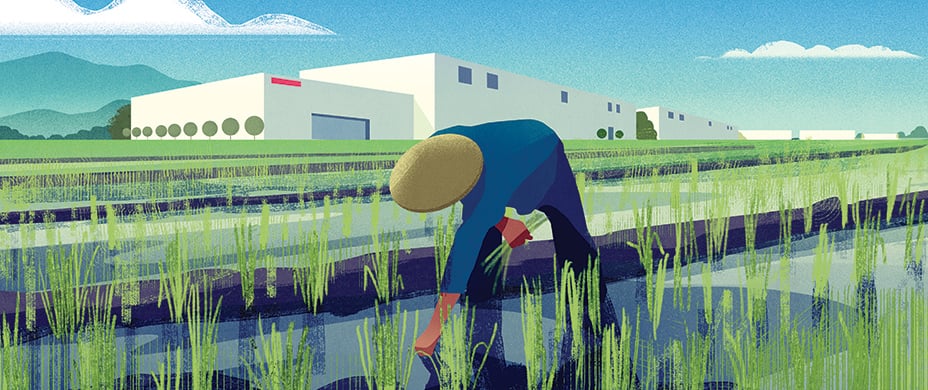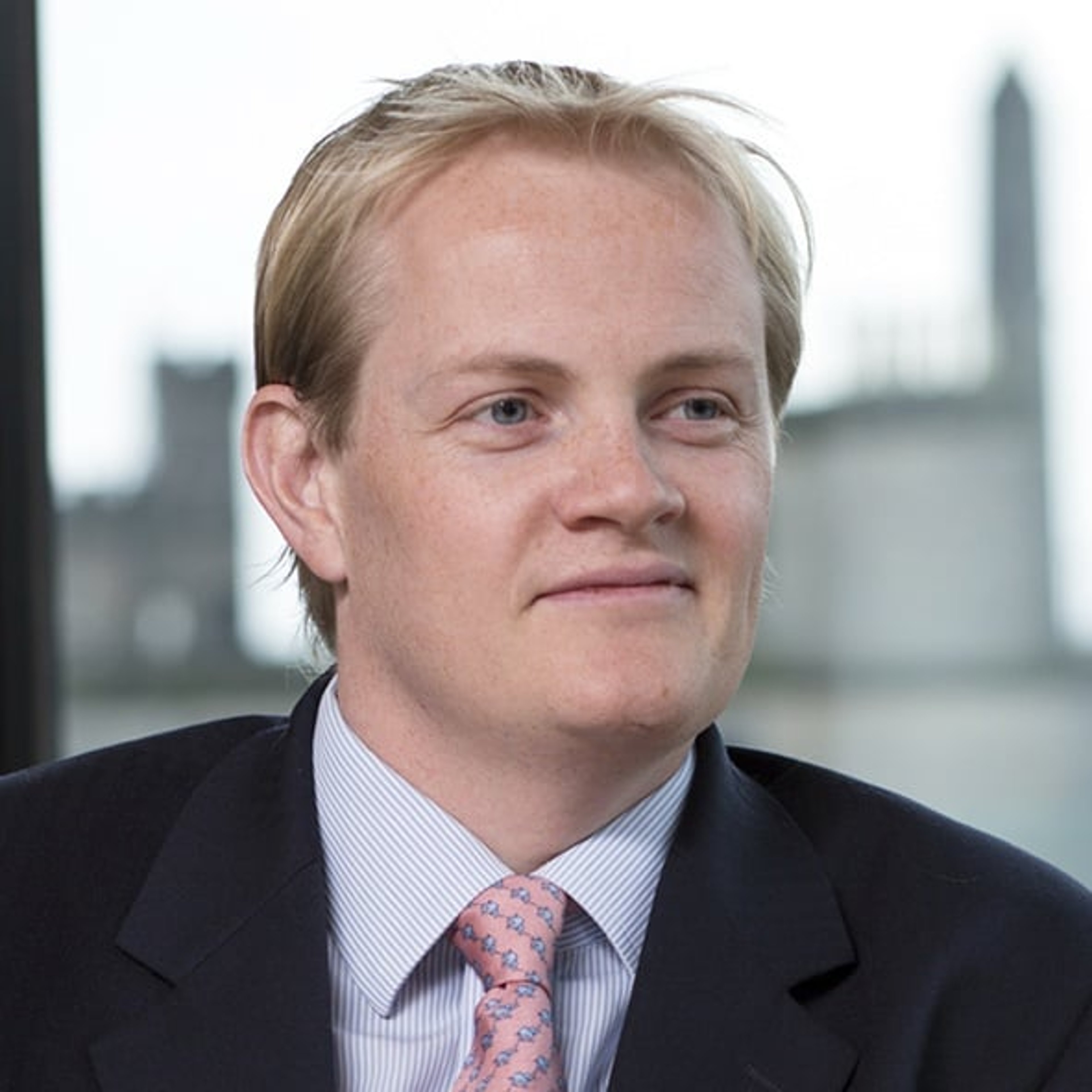
Illustration by Andrew Lyons
Please remember that the value of an investment can fall and you may not get back the amount invested.
In Ho Chi Minh City, rivers of cars and motorcycles endlessly cross and merge from cluttered side streets into French-built boulevards. This intricate interplay, somewhere between cooperation and competition, looks like chaos. But it works.
Sporting a fetching, orange-striped helmet, I’m riding pillion on a 1980s-model Vespa, touring the southern Vietnamese city. Our ride follows a day of back-to-back meetings with portfolio companies and prospective additions. It reacquaints me with the sights, sounds and smells of Saigon: the old name used interchangeably with that honouring ‘Uncle Ho’, communist father of modern Vietnam.
I always enjoy a re-immersion in one of my favourite cities, an evocative fusion of new Asia and old Europe. The buzz and klaxons of uncountable vehicles and the wafting smell of fresh baguettes for Saigon’s meaty, herby bánh mì sandwiches complement passing views of the pompous and picturesque architecture of French colonialism.
The city feels different this time, but why? One tangible change is the increased proportion of four-wheeled to two-wheeled traffic. More widely, I sense a city crossing the threshold from being an emerging market metropolis to something more… emerged. Saigon is still affable and affordable, but its bars and restaurants are smartening up. Things work better than I remember.
Structural growth star
Meetings with company bosses, as well as economists, bankers and Communist Party officials with long titles, reinforce my sense that Vietnam is the best structural growth story of any country in Asia. It’s a likely exception to the rule that most emerging markets never quite get there.
Instead, like Thailand or Malaysia, they get stuck in the ‘middle-income trap’ of about $10,000 (£8,000) per capita. Vietnam is still far short of that at $4,000, but the vibrancy of Saigon and the sense of purpose conveyed in our meetings suggest a country on the fast track trodden by Asian tigers such as South Korea and Taiwan.
I first came here in 2016, which was 10 years after Baillie Gifford first invested via Dragon Capital’s VEIL (Vietnam Enterprise Investments Limited) fund. Dragon was founded in 1995 by a British entrepreneur, five years before the first stock exchange opened in the then-hardline Marxist-Leninist country.

Throughout the 2000s, official ideology and red tape made VEIL the only easy way to invest in Vietnamese firms. But opportunities have opened up since in sectors as diverse as seafood, IT outsourcing services, mobile telephony and construction materials.
March of the makers
Others’ experiences taught Vietnam’s leaders that the only proven way to fund a sustainably growing domestic economy is through manufacturing goods for export. In other words, not by relying on commodities with their cyclical prices or by luring foreign finance, which floods in and out with every regional boom and bust.
How has Vietnam pulled off this trick and become a successful export manufacturing base? After all, it carries heavy geopolitical baggage: many decades fighting France, the US and (briefly) China, plus a bitter civil war and reunification. That anti-capitalist hard line started softening in the late 1980s. Now the government’s priorities include tackling residual corruption, often involving real estate, and sorting out infrastructure failures such as occasional power cuts.
We're lucky to be able to tap into valuable perspectives on Vietnam's progress. Joe Studwell has written authoritatively on the subject: How Asia Works: Success and Failure in the World’s Most Dynamic Region. The book details the must-haves of reformed and productive agriculture, competitive export manufacturing and tight controls on international capital. Because it has all three, Joe calls Vietnam “the most exciting country [in south-east Asia] from an economic perspective”.
Well positioned
Other favourable factors include 2,000 miles of coastline on the maritime trade highway between east Asia and the west, good relations with China and the US (a rare double), and a young, well-educated workforce.
In Vietnam’s case, being a one-party state – albeit less top-down than China – means a government that gets things done. As in Taiwan and South Korea, both virtual military dictatorships in their rapid development phases, Vietnam’s leaders are focused on doing whatever is necessary for export success.
That includes installing the infrastructure: the ports, the roads and the supply chains that tend to predetermine rapid progress. Vietnam has cannily created a proper manufacturing supply chain, with all the components and logistical structures feeding into making its smartphone or sports-shoe-making factories highly productive and efficient.
Its timing is excellent. China’s Covid-closed ports convinced many offshore manufacturers that relying on one country is risky. Also, as that giant neighbour moves up the value chain in the next couple of decades, a couple of trillion dollars’ worth of low-end manufacturing is likely to leave. We expect a large portion to cross the border to Vietnam.
This partly explains why the big exporters are foreign brands setting up their manufacturing, helped by Vietnamese skills in languages, notably Japanese and Korean. Samsung is by far Vietnam’s biggest exporter, having invested around $12bn in the country in the past six years.
There aren’t yet many Vietnamese exporters of scale for us to invest in. One exception is Vinh Hoan, the world’s largest producer of frozen pangasius, also known as catfish, more appetisingly rebranded as bassa. This white fish is an increasingly popular source of protein, and Vinh Hoan has big global clients, including Tesco, Aldi and Walmart.

Its impressive managers explained their plan to move up the value chain by selling extracts such as collagen, a protein taken as a health supplement. They also discussed exploiting the firm’s freeze-drying expertise to supply other ingredients, such as dragon fruit for smoothies for global coffee chains.
Otherwise, we look for domestic growth stocks buoyed up by a growing wave of prosperity and a rising middle class. One example is Mobile World, which accounts for about 50 per cent of local mobile phone sales and runs a growing grocery chain. We also look for the best of Vietnam’s outsourcing companies, such as FPT, Vietnam’s IT and telecoms leader and a global powerhouse for digital services. Its biggest market is Japan, serving Sony, Hitachi and Panasonic.
Farms to factories
From the capital Hanoi, where we’ve flown for the final phase of our trip, we travel by minibus to Bac Ninh Industrial Zone. Vietnamese hosts like to show off this giant business park between the capital and the northern port of Haiphong.
Its backdrop is not the tourist-brochure Vietnam of sugarloaf mountains and tiered green paddy fields but flat utilitarian farmland. A dull landscape, maybe, but one whose productiveness seeded the country’s present success.
Thanks to communist land distribution and subsequent pro-market reforms, Vietnam’s farming became profitable and more competitive. Its productivity far outstripped that of its south-east Asian neighbours, providing the capital and releasing the labour that helped kickstart the thriving manufacturing sector.
Now this ancient peasant-farmed plain is being encroached by neat roads, roundabouts and well-tended topiary, peppered with vast hangar-like factories whose signage proclaims a who’s-who of multinational manufacturing: Canon, Microsoft, Samsung, Foxconn. Will there be more native Vietnamese names among them next time I come? I got a feeling from my meetings that there will be. Beyond these rows of cavernous sheds and surrounding car parks, the fields stretch to the horizon, offering endless space for growth.
To discover more about Vietnam and its neighbours, listen to Emerging Markets investment manager Ben Durrant in our podcast series at bailliegifford.com/podcasts
Important information
The views expressed should not be considered as advice or a recommendation to buy, sell or hold a particular investment. They reflect opinion and should not be taken as statements of fact nor should any reliance be placed on them when making investment decisions.
This communication contains information on investments which does not constitute independent research. Accordingly, it is not subject to the protections afforded to independent research, but is classified as advertising under Art 68 of the Financial Services Act (‘FinSA’) and Baillie Gifford and its staff may have dealt in the investments concerned.
All information is sourced from Baillie Gifford & Co and is current unless otherwise stated.
The images used in this communication are for illustrative purposes only.
Baillie Gifford & Co and Baillie Gifford & Co Limited are authorised and regulated by the Financial Conduct Authority (FCA). Baillie Gifford & Co Limited is an Authorised Corporate Director of OEICs.
Baillie Gifford Overseas Limited provides investment management and advisory services to non-UK Professional/Institutional clients only. Baillie Gifford Overseas Limited is wholly owned by Baillie Gifford & Co.
Baillie Gifford & Co and Baillie Gifford Overseas Limited are authorised and regulated by the FCA in the UK.
Persons resident or domiciled outside the UK should consult with their professional advisers as to whether they require any governmental or other consents in order to enable them to invest, and with their tax advisers for advice relevant to their own particular circumstances.
Financial Intermediaries
This communication is suitable for use of financial intermediaries. Financial intermediaries are solely responsible for any further distribution and Baillie Gifford takes no responsibility for the reliance on this document by any other person who did not receive this document directly from Baillie Gifford.
Europe
Baillie Gifford Investment Management (Europe) Limited provides investment management and advisory services to European (excluding UK) clients. It was incorporated in Ireland in May 2018. Baillie Gifford Investment Management (Europe) Limited is authorised by the Central Bank of Ireland as an AIFM under the AIFM Regulations and as a UCITS management company under the UCITS Regulation. Baillie Gifford Investment Management (Europe) Limited is also authorised in accordance with Regulation 7 of the AIFM Regulations, to provide management of portfolios of investments, including Individual Portfolio Management (‘IPM’) and Non-Core Services. Baillie Gifford Investment Management (Europe) Limited has been appointed as UCITS management company to the following UCITS umbrella company; Baillie Gifford Worldwide Funds plc. Through passporting it has established Baillie Gifford Investment Management (Europe) Limited (Frankfurt Branch) to market its investment management and advisory services and distribute Baillie Gifford Worldwide Funds plc in Germany. Similarly, it has established Baillie Gifford Investment Management (Europe) Limited (Amsterdam Branch) to market its investment management and advisory services and distribute Baillie Gifford Worldwide Funds plc in The Netherlands. Baillie Gifford Investment Management (Europe) Limited also has a representative office in Zurich, Switzerland pursuant to Art. 58 of the Federal Act on Financial Institutions (“FinIA”). The representative office is authorised by the Swiss Financial Market Supervisory Authority (FINMA). The representative office does not constitute a branch and therefore does not have authority to commit Baillie Gifford Investment Management (Europe) Limited. Baillie Gifford Investment Management (Europe) Limited is a wholly owned subsidiary of Baillie Gifford Overseas Limited, which is wholly owned by Baillie Gifford & Co. Baillie Gifford Overseas Limited and Baillie Gifford & Co are authorised and regulated in the UK by the Financial Conduct Authority.
Hong Kong
Baillie Gifford Asia (Hong Kong) Limited
柏基亞洲(香港)有限公司 is wholly owned by Baillie Gifford Overseas Limited and holds a Type 1 and a Type 2 license from the Securities & Futures Commission of Hong Kong to market and distribute Baillie Gifford’s range of collective investment schemes to professional investors in Hong Kong. Baillie Gifford Asia (Hong Kong) Limited
柏基亞洲(香港)有限公司 can be contacted at Suites 2713-2715, Two International Finance Centre, 8 Finance Street, Central, Hong Kong. Telephone +852 3756 5700.
China
Baillie Gifford Investment Management (Shanghai) Limited
柏基投资管理(上海)有限公司(‘BGIMS’) is wholly owned by Baillie Gifford Overseas Limited and may provide investment research to the Baillie Gifford Group pursuant to applicable laws. BGIMS is incorporated in Shanghai in the People’s Republic of China (‘PRC’) as a wholly foreign-owned limited liability company with a unified social credit code of 91310000MA1FL6KQ30. BGIMS is a registered Private Fund Manager with the Asset Management Association of China (‘AMAC’) and manages private security investment fund in the PRC, with a registration code of P1071226.
Baillie Gifford Overseas Investment Fund Management (Shanghai) Limited
柏基海外投资基金管理(上海)有限公司(‘BGQS’) is a wholly owned subsidiary of BGIMS incorporated in Shanghai as a limited liability company with its unified social credit code of 91310000MA1FL7JFXQ. BGQS is a registered Private Fund Manager with AMAC with a registration code of P1071708. BGQS has been approved by Shanghai Municipal Financial Regulatory Bureau for the Qualified Domestic Limited Partners (QDLP) Pilot Program, under which it may raise funds from PRC investors for making overseas investments.
South Korea
Baillie Gifford Overseas Limited is licensed with the Financial Services Commission in South Korea as a cross border Discretionary Investment Manager and Non-discretionary Investment Adviser.
Japan
Mitsubishi UFJ Baillie Gifford Asset Management Limited (‘MUBGAM’) is a joint venture company between Mitsubishi UFJ Trust & Banking Corporation and Baillie Gifford Overseas Limited. MUBGAM is authorised and regulated by the Financial Conduct Authority.
Australia
Baillie Gifford Overseas Limited (ARBN 118 567 178) is registered as a foreign company under the Corporations Act 2001 (Cth) and holds Foreign Australian Financial Services Licence No 528911. This material is provided to you on the basis that you are a “wholesale client” within the meaning of section 761G of the Corporations Act 2001 (Cth) (“Corporations Act”). Please advise Baillie Gifford Overseas Limited immediately if you are not a wholesale client. In no circumstances may this material be made available to a “retail client” within the meaning of section 761G of the Corporations Act.
This material contains general information only. It does not take into account any person’s objectives, financial situation or needs.
South Africa
Baillie Gifford Overseas Limited is registered as a Foreign Financial Services Provider with the Financial Sector Conduct Authority in South Africa.
North America
Baillie Gifford International LLC is wholly owned by Baillie Gifford Overseas Limited; it was formed in Delaware in 2005 and is registered with the SEC. It is the legal entity through which Baillie Gifford Overseas Limited provides client service and marketing functions in North America. Baillie Gifford Overseas Limited is registered with the SEC in the United States of America.
The Manager is not resident in Canada, its head office and principal place of business is in Edinburgh, Scotland. Baillie Gifford Overseas Limited is regulated in Canada as a portfolio manager and exempt market dealer with the Ontario Securities Commission (‘OSC’). Its portfolio manager licence is currently passported into Alberta, Quebec, Saskatchewan, Manitoba and Newfoundland & Labrador whereas the exempt market dealer licence is passported across all Canadian provinces and territories. Baillie Gifford International LLC is regulated by the OSC as an exempt market and its licence is passported across all Canadian provinces and territories. Baillie Gifford Investment Management (Europe) Limited (‘BGE’) relies on the International Investment Fund Manager Exemption in the provinces of Ontario and Quebec.
Israel
Baillie Gifford Overseas Limited is not licensed under Israel’s Regulation of Investment Advising, Investment Marketing and Portfolio Management Law, 5755-1995 (the Advice Law) and does not carry insurance pursuant to the Advice Law. This material is only intended for those categories of Israeli residents who are qualified clients listed on the First Addendum to the Advice Law.
92922 10045446






